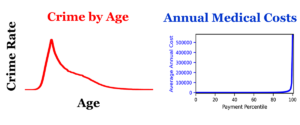This is the first of a planned 52 week marathon to pull together 15 years of research and scientific discovery. During this period I developed new methods for analyzing data using methods that I have developed from scratch. I call the processes I developed “data pattern analysis”.
I solved at least two scientific puzzles that can’t be solved with existing scientific methods. These are the age crime curve puzzle and the health cost puzzle. I also created a population health risk ranking model that ranks health levels with an accuracy that is unmatched by commercial systems.
I have made repeated attempts to explain the solutions I have developed. These attempts have mostly failed. In my opinion, this is due to the novelty of the solutions and the lack of a foundational science to build upon. I believe that the solutions are understandable if the basic foundation is laid first.
Why should anyone care about my work? Consider the following.
The age crime curve indicates that one of the major causes of crime is age. Criminologists don’t understand the causes of the age crime curve. Without understanding one of the major causes of crime, how can one really affect the crime rate?
Similarly, the health cost curve indicates that some people spend considerably more on health costs than others. Yet no one understands the underlying causes of the health cost curve. How can we change what we can’t understand?
Over the next 52 weeks, I will try to build the foundational theories and methods to explain why crime varies by age and why health costs are so high for a very few people.
In the process, I will teach my readers how to think about and solve problems like these.

The Age Crime Curve and the Health Cost Puzzles

Hi Thomas
Not sure what you are doing to solve these two situations. Think I would need more info on the data used to understand the crime data- ie what kind of crime, who decides what a crime is, what genders, does the ‘crime’ change with age. Post WW2 in Europe a lot of countries brought in national service. This took the majority of younger men off civi street and taught them discipline – but is this tackling the way men are brought up to fight rather than negotiate. Hi unemployment too might be a factor or discrimination. What I am saying, I guess is that stats may give the result but not the causes – for that we need to look wider and more completely – is that what you are doing?
Again medical costs – hmm – it is not just that some people pay more – but the why they pay more – are they targeted because of affordability – ie prescriptions by country – only possible with monopolies in control. Are there only truly a few ill people.
Anyway – interested in what you are thinking – so may follow your weekly blog 🙂
Thanks for your insightful reply. I would like to spend some time discussing these issues.
I have not found many people interested in the topic of “what is crime?”
Have you read Durkheim’s work of the subject?
https://books.google.com/books?id=YEBdDwAAQBAJ&pg=PA85&source=gbs_toc_r&cad=4#v=onepage&q&f=false